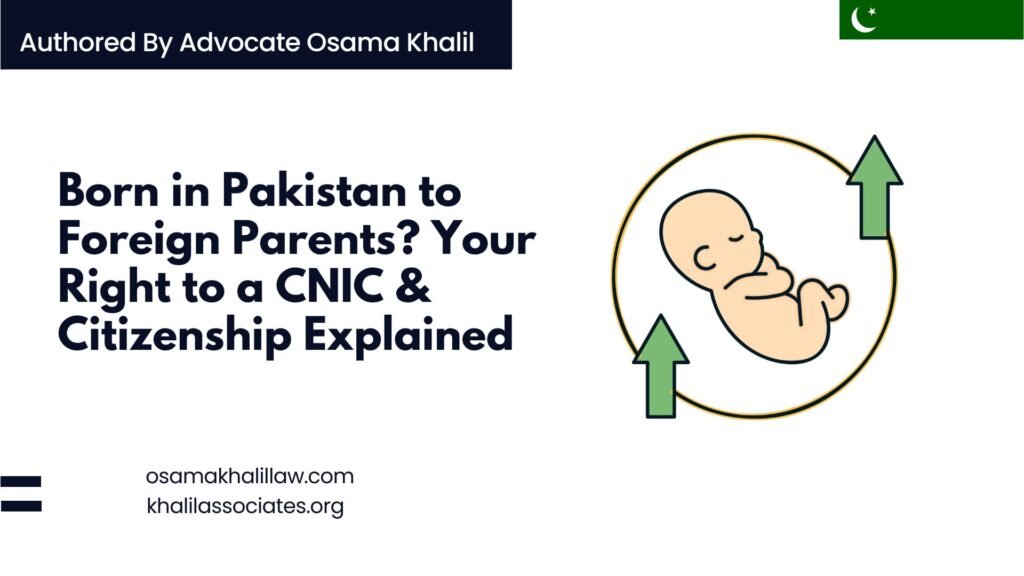
A significant judgment from the Islamabad High Court has clarified the rights of individuals born in Pakistan to foreign parents. The case involved a man named Saeed Abdi Mahmud, who was born in Pakistan to foreign parents from Somalia. Despite being born in the country, he faced immense difficulty obtaining his Computerized National Identity Card (CNIC) because NADRA focused on his parents’ nationality. This ruling is a crucial guide for anyone born in Pakistan to foreign parents and confirms that the place of birth, not the parents’ citizenship, is the key factor for eligibility.
What Does the Law Say About Citizenship by Birth?
The legal foundation for this right is Section 4 of the Pakistan Citizenship Act, 1951. This law is very clear: every person born in Pakistan after the commencement of this Act is a citizen of Pakistan by birth. The court emphasized that there are only two exceptions to this rule. The first exception is if the child’s father was an envoy or diplomat of a foreign government accredited to Pakistan. The second exception is if the father was an enemy alien and the child was born in a place under enemy occupation. If neither of these rare exceptions applies, then a person born in Pakistan to foreign parents is automatically a citizen.
Why Did NADRA Refuse to Issue a CNIC Initially?
The National Database and Registration Authority (NADRA) is responsible for issuing CNICs. According to its own law, NADRA must issue a card to any citizen of Pakistan who is 18 years of age or older and provides a valid birth certificate. However, in this case, NADRA refused the application because the officials focused on the fact that the applicant was born in Pakistan to foreign parents from Somalia. The court’s judgment made it clear that this was an incorrect interpretation of the law. NADRA’s role is to verify identity and age, not to decide citizenship status when the Citizenship Act already provides a clear answer.
What Was the Court’s Final Decision and Order?
The Islamabad High Court ruled decisively in favor of Saeed Abdi Mahmud. The judges declared that he, by virtue of being born in Pakistan, was a citizen according to the Citizenship Act. The court then gave specific directions on what he needed to do next. He was directed to approach the Ministry of Interior with a duly filled application form for citizenship. The court further ordered the Ministry of Interior to process his application according to the law and grant him citizenship, as he was clearly eligible under Section 4 of the Act. This created a clear pathway for others born in Pakistan to foreign parents.
How Does the Constitution Protect This Right?
The court powerfully invoked Article 4 of the Constitution of Pakistan. This article guarantees every person, whether a citizen or not, the right to be treated in accordance with the law. The judges stated that denying someone their rightful citizenship, especially when they were born in Pakistan to foreign parents who were not diplomats or enemy aliens, would be a serious violation of this fundamental constitutional right. This means the state cannot arbitrarily deny citizenship to those who qualify for it under the law.
Does This Right Apply to Refugees as Well?
This is a critical distinction made by the court. The right of citizenship for those born in Pakistan to foreign parents does not extend to refugees. Refugees are people who have fled their home country due to persecution and are in Pakistan under international protection agreements. Their status is temporary, and the children of refugees born in Pakistan do not automatically become citizens. The court affirmed that the Citizenship Act’s provisions for those born in Pakistan to foreign parents are intended for children of foreigners who are living in Pakistan ordinarily, not under a specific refugee status.
What Are the Practical Steps to Claim Your Citizenship?
If you were born in Pakistan to foreign parents, this judgment is your legal backing. Here are the practical steps you should take, as outlined by the court:
- Gather Documentation: Secure your official birth certificate proving you were born in Pakistan.
- Apply to the Ministry of Interior: Submit a duly filled application for citizenship to the Ministry of Interior, not just NADRA.
- Quote the Law: Clearly state in your application that you are applying under Section 4 of the Pakistan Citizenship Act, 1951, as interpreted by the Islamabad High Court.
- Follow Up: Once the Ministry of Interior grants citizenship, you can then approach NADRA with that proof to obtain your CNIC without any issues.
Conclusion: A Major Win for Clarity and Equality
The Saeed Abdi Mahmud case is a major step forward for clarity and legal rights in Pakistan. It firmly establishes that being born in Pakistan to foreign parents grants a right to citizenship, provided the parents are not covered by the very narrow exceptions. This judgment ensures that thousands of people born and raised in Pakistan are not denied their national identity due to bureaucratic confusion. It reinforces that the law of the soil (jus soli) applies in Pakistan, guaranteeing equality and protection for all who are born within its borders.
Legal Assistance
For professional legal guidance and support in immigration matters, you may contact:
Mr. Osama Khalil
Lawyer & Legal Consultant
📞 Phone: 0316-1829946
📧 Email: contact@osamakhalillaw.com | contact@khalilassociates.org
